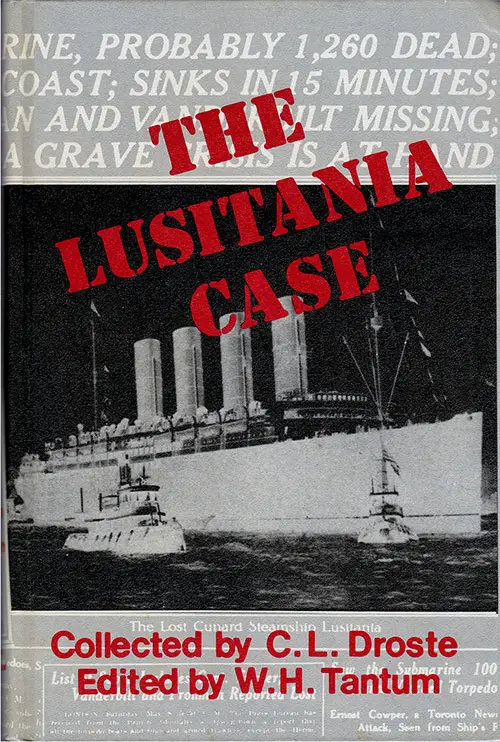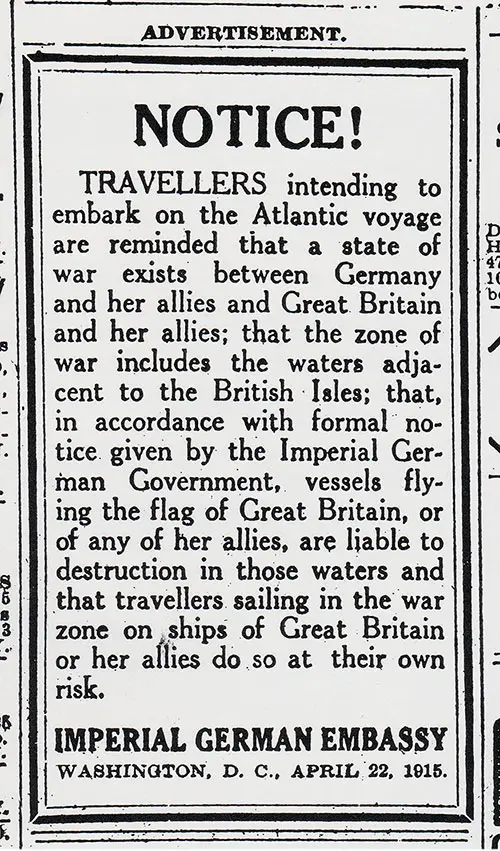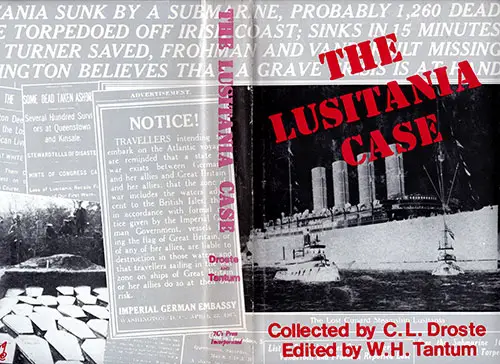The Lusitania Case - 1972/1915

The Lusitania Case, Collected by C. L. Droste, Edited by W. H. Tantum, 1972. Originally Published in 1915. | GGA Image ID # 184e15e2f6
Collected by C.L. Droste
Edited by W.H. Tantum – ISBN 0911962 03 4
Published by: Patrick Stephens Limited, London, Great Britain
Preface
Only a few years before the whole civilized world had waited and watched while the first fugitive splutters of the wireless told the story of the sinking of the Titanic.
Hundreds of millions of people waited and watched for the final truth of the sinking of the greatest ship in the world, and the memory of that horror in the American mind still survived the reports of more recent battles.
But the Titanic was an accident. Now, all the circumstances of the earlier tragedy were repeated as the result of a wanton act of man.
Few of the people who were alive in America on the day and night when the first reports of the Lusitania Massacre began to arrive will ever forget the horror, the indignation, the stupefaction produced by that crime.
For twenty-four hours the country refused to believe that a civilized nation, presumably holding to the same ideals and the same conceptions of humanity, could permit its sailors to launch against a passenger ship, laden with women and children and carrying neutrals as well as belligerents, a torpedo which would inevitably result in the slaughter of innocent and helpless human beings.
When the truth was no longer to be doubted there swept from one end of the United States to the other an emotion which destroyed sympathy with Germany everywhere except among people of German origin or politicians dependent upon hyphenated votes for their political existence.
The cause of Germany, so far as it had an appeal to the sympathy, the intelligence, and the conscience of the United States, went down with the Lusitania.
Thereafter there could be but one issue: Should the United States remain neutral?—or should she enter the war on the Allied side? The brand on Cain’s forehead was not more conspicuous or more fatal than the mark left upon the German cause by the Lusitania Massacre.
The Lusitania Massacre is one of the great landmarks in history, not alone in American history but in human history, because it ensured German defeat in the World War.
Looking to the terrible crisis of 1918 it is unmistakable that, had America been neutral in that hour, the victory of the alliance against Germany would have been unthinkable, nor is it less probable that Allied consent to peace by negotiation would have followed the defeats of the year which we are now to examine, had not the entrance of the United States served to create new hopes and restore shaken confidence.
American decision in the World War was finally made on the basis of the Lusitania.
Between the Lusitania Massacre and the entrance of American troops into the line at Château-Thierry a little more than three years were to elapse; but while, on the surface, America continued long after the earlier event to seem blind to the truth, deaf to the appeals of honour and safety alike, the forces released by this crime continued to march—continued to extend the area of their influence—until a united country ultimately entered the European war.
And, as a final detail, it is at least one of the most striking coincidences of which we have any knowledge that those terms of peace which imposed the sentence of the victorious nations upon a defeated Germany were delivered into German hands on the fourth anniversary of the sinking of the Lusitania.
by W.H. Tantum IV, Editor

NOTICE!
TRAVELLERS intending to embark on the Atlantic voyage are reminded that a state of war exists between Germany and her allies and Great Britain and her allies; that the zone of war includes the waters adjacent to the British Isles; that, in accordance with formal notice given by the Imperial German Government, vessels flying the flag of Great Britain, or of any of her allies, are liable to destruction in those waters and that travellers sailing in the war zone on ships of Great Britain or her allies do so at their own risk.
IMPERIAL GERMAN EMBASSY
Washington, D. C., April 22. 1915.
Table of Contents
- —Should Passenger Vessels Carry War Material?
- —English Orders to Fight Submarines
- —The German Warning
- —The American Warning
- —The Cunard Company's Warning
- —American Ruling (not law) on Foreign Armed Merchant Vessels
- —Was the Lusitania Armed?
- —The Manifest of the Lusitania
- —Who is Responsible?
- —Neutral Views
- —English Comments
- —American Comments
- —Austrian and German Comments
- —Hysterical Comments
- —Stories of Passengers
- —Statement of the Cunard Company
- —The Official English Investigation
- —Submarines Cannot Give Warning
- —A Review

Full Dustjacket, The Lusitania Case, 1972. | GGA Image ID # 184e6bf23d
Library of Congress Catalog Listing
- Personal name: Droste, Christian Ludwig, 1862- comp.
- Uniform title: Documents on the war of the nations from neutral and anti-German sources. 2. Lusitania case
- Main title: The Lusitania case. Collected by C. L. Droste. Edited by W. H. Tantum IV.
- Published/Created: Riverside, Conn., 7 C's Press [1972]
- Description: 224 p. illus. 24 cm.
- ISBN: 0911962034
- LC classification: D592.L8 D76
- LC Subjects: Lusitania (Steamship)
- Notes. At head of title: Documents on the war.; Originally published in 1915 as v. 2 of Documents on the war of the nations from neutral and anti-German sources.
- LCCN: 72182491
- Dewey class no.: 940.4/514
- Geographic area code: e-uk--- e-gx---
- Type of material: Book
